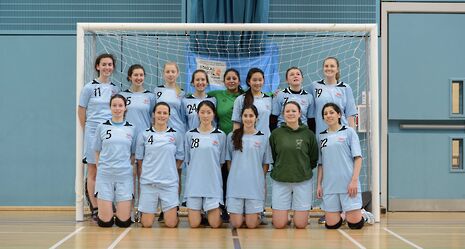Try your hand at the latest sporting craze
Talitha Veith tells us why Cambridge should give up on dreams of rowing success and take up a European craze instead

“Football, but with the obvious difference.” That’s all I’d heard of handball before I was asked to write an article about it (not this one though!). So before I went to my first training session, I thought it would be wise to look it up: invented in Germany, it is one of the most widely played sports on the continent. Ever since the London Olympics, it’s been a growing phenomenon in the UK as well.
Handball is basically like football but, wait for it, you’re supposed to use your hands, not your feet. There are fewer players, and they run across the smaller court at an amazing speed. The attacking team moves the ball around quickly to try and find a hole in the defence – making the fans feel as though they’re watching a magician doing the cups-and-balls trick. Cracking open a weak spot in the defence, the attacking player jumps through, using the time in the air to bury the ball in the net before crashing to the floor. Trust me, it’s not as painful as it sounds!
Handball is an all-out intense sport. To defend their goals, players frequently jostle, push and shove – sometimes legally under the rules, sometimes incurring fouls. The great thing is that there is a position for every type of physique. A good team needs a strong pivot to split the other team’s defence, fast and technically skilled wing players, tall back players with strong shots, and a creative centre acting as the playmaker. Most importantly though, a team needs a fearless (read: crazy) goalie.
That brings me to another point. Let’s be honest, handball is not a sport for the faint-hearted. Experience in another team sport is helpful: basketball will give you the edge in handling the ball, volleyball in jumping and rugby in tackling (although wrestling someone to the ground tends to be frowned upon in handball).
That’s not to say it’s not fun. The trainings are mixed gender, even though real games are not, and going to the pub after training is an indispensable part of handball. The commitment consists of a two-hour training session per week, three weekends of competition per year for the British University Championship and of course the big Varsity match, plus some occassional friendlies. For people looking for a greater commitment, several university players also play for the city club, meaning opportunities for glory (and a blue) are in plentiful supply. It may not have the prestige of the more ‘traditional’ Varsity sports like rowing and rugby, but we always lose in those anyway. And who wants to get up early before lectures to be shouted at in a damp and sweaty boat?
Last year, the women’s Light Blues finished third at the Plate finals while the men’s team steamrolled their way through the UK University Championships to become British champions.
So if you fancy defeating Oxford, forget rowing and join the handball team to bring glory to Cambridge!
 News / Uni Scout and Guide Club affirms trans inclusion 12 December 2025
News / Uni Scout and Guide Club affirms trans inclusion 12 December 2025 News / Pembroke to convert listed office building into accom9 December 2025
News / Pembroke to convert listed office building into accom9 December 2025 Features / Searching for community in queer Cambridge10 December 2025
Features / Searching for community in queer Cambridge10 December 2025 News / Uni redundancy consultation ‘falls short of legal duties’, unions say6 December 2025
News / Uni redundancy consultation ‘falls short of legal duties’, unions say6 December 2025 News / Gov declares £31m bus investment for Cambridge8 December 2025
News / Gov declares £31m bus investment for Cambridge8 December 2025








